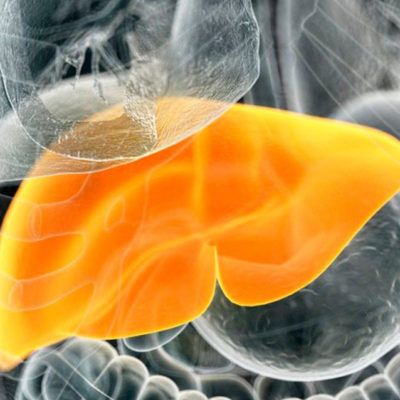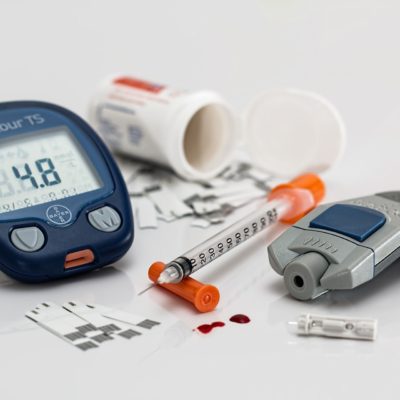"In 2016, our lab discovered a hormone called asprosin, which stimulates appetite and increases blood glucose levels by acting on the hypothalamus and the liver," explained Atul Chopra, MD, PhD, senior author on the study, Investigator at the Harrington Discovery Institute and Associate Director of the Oxford-Harrington Rare Disease Center, Attending Medical Geneticist at UH, … [Read more...]
Weight Management News

High Cardiovascular Risk is Associated with Symptoms of Depression
Cardiovascular disease and depression are thought to be closely related due to similar risk factors, including inflammation and oxidative stress. Although it has been shown that depression could be a risk factor for developing cardiovascular disease, studies analyzing the potential impact of cardiovascular health on developing depression are scarce. In the new study, the … [Read more...]
Plant-Based Omega-3s May Boost Heart Health, Reduce Risk of Heart Disease
In a comprehensive literature review, the researchers found that consuming ALA that is found in plant-based foods like walnuts and flaxseeds was associated with a 10% lower risk of cardiovascular disease and a 20% reduced risk of fatal coronary heart disease. Penny Kris-Etherton, Evan Pugh University Professor of Nutritional Sciences at Penn State, said the review suggests … [Read more...]
Exercise Post-Vaccine Bumps up Antibodies, New Study Finds
Researchers at Iowa State University found 90 minutes of mild- to moderate-intensity exercise directly after a flu or COVID-19 vaccine may provide an extra immune boost. In the newly published study, participants who cycled on a stationary bike or took a brisk walk for an hour-and-a-half after getting a jab produced more antibodies in the following four weeks compared to … [Read more...]
How Regular Exercise can Protect Against Fatty Liver Associated Diseases
Exercise not only trains the muscles but can also prevent the development of fatty liver. A new study by the German Center for Diabetes Research (DZD), Helmholtz Munich and Tübingen University Hospital shows which molecular adaptations, in particular of the liver mitochondria, can be observed in this process. The study has now been published in Molecular … [Read more...]
Researchers call for a focus on fitness over weight loss for obesity-related health conditions
The prevalence of obesity around the world has tripled over the past 40 years, and, along with that rise, dieting and attempts to lose weight also have soared. But according to a review article publishing September 20 in the journal iScience, when it comes to getting healthy and reducing mortality risk, increasing physical activity and improving fitness appear to be superior to … [Read more...]
Prior Training can Accelerate Muscle Growth Even after Extended Idleness
According to a report by the American Psychological Association published in February 2021, 42% of American adults reported unintended weight gain since the COVID-19 pandemic began, averaging about 29 pounds. For those who are still struggling to get back on track with their exercise routine, there is encouraging news: new research from the University of Arkansas indicates … [Read more...]
Dieting: Villain or scapegoat?
For decades, there has been an accepted definition of dieting in academia, and in society as a whole. Michael Lowe, PhD, a professor in Drexel University's College of Arts and Sciences, has recently reevaluated the decades of dieting research to redefine the way researchers and the public define -- and therefore understand -- dieting and the culture of weight loss. According … [Read more...]
Boosting Body Heat Production: A new Approach for Treating Obesity
A receptor that helps conserve energy when food is scarce may be the key to a safer approach to treating diet-induced obesity, research led by the Garvan Institute of Medical Research has revealed. In a study using experimental models and fat tissue biopsies from obese individuals, the team revealed that blocking a specific receptor of the molecule neuropeptide Y (NPY), … [Read more...]
Losing Weight Through Exercise
Why physical activity entices you to eat more - and how to fight it Worldwide 39 percent of the adults were overweight in 2016, according to statistics of the World Health Organization. In the US the prevalence of obesity was 42.4 percent in 2017/2018, according to a survey of the National Center for Health Statistics (NCHS). Concurrently millions of people want to lose … [Read more...]
Cells Burn More Calories After Just One Bout of Moderate Aerobic Exercise, OSU Study Finds
In a recent study testing the effects of exercise on overall metabolism, researchers at Oregon State University found that even a single session of moderate aerobic exercise makes a difference in the cells of otherwise sedentary people. Mitochondria are the part of the cell responsible for the biological process of respiration, which turns fuels such as sugars and fats into … [Read more...]
Satiety factor Associated with prolonged exercise
A drug that helps us to eat less could help the more than 650 million people around the world who live with obesity. One of the emerging drug candidates that interest researchers is the hormone GDF15 that, when given to rodents, lowers their appetite and body weight. New research from the University of Copenhagen finds that the body produces large amounts GDF15 during extended … [Read more...]
Toddler sleep patterns Significant
Establishing a consistent sleep schedule for a toddler can be one of the most challenging aspects of child rearing, but it also may be one of the most important. Research findings from a team including Lauren Covington, an assistant professor in the University of Delaware School of Nursing, suggest that children with inconsistent sleep schedules have higher body mass index … [Read more...]
Deciphering the genetics behind eating disorders
Anorexia nervosa, bulimia nervosa and binge-eating disorder are the three main eating disorders that 4 out of in 10 individuals living in Western Europe will experience at some point in their lives. In recent years, studies on the genetic basis of anorexia nervosa have highlighted the existence of predisposing genetic markers, which are shared with other psychiatric … [Read more...]
Survival tip: Start at normal weight and slowly add pounds
People who start adulthood with a body mass index (BMI) in the normal range and move later in life to being overweight -- but never obese -- tend to live the longest, a new study suggests. Adults in this category lived longer than even those whose BMI stayed in the normal range throughout their life. Those who started adulthood as obese and continued to add weight had the … [Read more...]
Danish and Chinese tongue taste broccoli and chocolate differently
Two studies from the University of Copenhagen show that Danes aren't quite as good as Chinese at discerning bitter tastes. The research suggests that this is related to anatomical differences upon the tongue of Danish and Chinese people. For several years, researchers have known that women are generally better than men at tasting bitter flavours. Now, research from the … [Read more...]
Dieting and weight worries on rise in Teenagers
Significantly higher numbers of Generation Z boys and girls in the UK are dieting to lose weight, and are likely to overestimate their own weight, finds a new UCL-led study. The research, published in JAMA Pediatrics, found that girls who are trying to lose weight are also more likely to experience depressive symptoms than in previous years. In 2015, 42% of 14-year-old … [Read more...]
Genetic differences in body fat shape men and women’s health risks
New research is revealing how genetic differences in the fat in men's and women's bodies affect the diseases each sex is likely to get. University of Virginia researchers Mete Civelek, PhD, Warren Anderson, PhD, and their collaborators have determined that differences in fat storage and formation in men and women strongly affect the activity of 162 different genes found in … [Read more...]
Gen Z not ready to eat lab-grown meat
New research by the University of Sydney and Curtin University to published on 8 September in Frontiers in Nutrition, found that, despite having a great concern for the environment and animal welfare, 72 percent of Generation Z were not ready to accept cultured meat -- defined in the survey as a lab-grown meat alternative produced by in-vitro cell cultures of animal cells, … [Read more...]
Obesity not related to how close you live to fast food or gyms
A new study from Lund University in Sweden has shown no correlation between obesity and how close you live to fast food restaurants or gyms. Studies from other countries have previously indicated that these factors may be important in adult obesity. The areas where we live are known to be important for our health. For example, obesity is more prevalent in deprived … [Read more...]
Coffee linked to lower body fat in women
Women who drink two or three cups of coffee a day have been found to have lower total body and abdominal fat than those who drink less, according to a new study published in The Journal of Nutrition. Researchers examined data from the National Health and Nutrition Examination Survey, organised by the Center for Disease Control (CDC) in the United States and looked at the … [Read more...]
An obesity protein discovery may lead to better treatments
A USC-led international team of scientists has found the precise shape of a key player in human metabolism, which could lead the way to better treatments for obesity and other metabolic disease. For the study, the scientists focused on a protein in the brain, the melanocortin 4 receptor (or MC4R). This receptor helps with regulating the body's energy balance by controlling … [Read more...]
A gut-to-brain circuit drives sugar preference and may explain sugar cravings
A little extra sugar can make us crave just about anything, from cookies to condiments to coffee smothered in whipped cream. But its sweetness doesn't fully explain our desire. Instead, new research shows this magic molecule has a back channel to the brain. Like other sweet-tasting things, sugar triggers specialized taste buds on the tongue. But it also switches on an … [Read more...]
Obesity is a critical risk factor for type 2 diabetes, regardless of genetics
Obesity increases the risk of developing type 2 diabetes by at least 6 times, regardless of genetic predisposition to the disease, concludes research published in Diabetologia (the journal of the European Association for the Study of Diabetes [EASD]). The study is by Dr Theresia Schnurr and Hermina Jakupovi?, Novo Nordisk Foundation Center for Basic Metabolic Research, Faculty … [Read more...]
Newly discovered brain response to obesity drug may inform future treatments
The U.S. Food and Drug Administration-approved drug liraglutide has been shown to help obese patients lose weight by suppressing their appetite. However, where and how the drug acts in the brain was not fully understood, until now. A new preclinical study from the Perelman School of Medicine at the University of Pennsylvania, published in Science Translational Medicine today, … [Read more...]
Neuron Found in Mice Could Have Implications for Effective Diet Drugs
Ever eaten something, gotten sick and then didn't want to eat that food again because of how it made you feel? That's because a signal from the gut to the brain produced that sickness, creating a taste aversion. Conventional wisdom renders there's one circuit in the brain that suppresses eating -- it comes from the stomach and makes you feel sick if you activate it too hard. … [Read more...]
Intermittent fasting: Live ‘fast,’ live longer?
For many people, the New Year is a time to adopt new habits as a renewed commitment to personal health. Newly enthusiastic fitness buffs pack into gyms and grocery stores are filled with shoppers eager to try out new diets. But, does scientific evidence support the claims made for these diets? In a review article published in the Dec. 26 issue of The New England Journal … [Read more...]
Why you should consider ‘exercise snacks’ and just moving more in 2020
If you want to get in better shape in 2020 you don't necessarily have to achieve it through long, arduous workouts according to researchers at the University of B.C. This past year, Jonathan Little, who teaches at the school of health and exercise science at UBC Okanagan, published two studies that showed the benefit of what he calls "exercise snacks." They are 20-second … [Read more...]
Type 2 diabetes remission possible with ‘achievable’ weight loss
People who achieve weight loss of 10% or more in the first five years following diagnosis with type 2 diabetes have the greatest chance of seeing their disease go into remission, according to a study led by the University of Cambridge. The findings suggest that it is possible to recover from the disease without intensive lifestyle interventions or extreme calorie … [Read more...]
Eat This, Not That: Avoiding Holiday Weight Gain
ORLANDO (Ivanhoe Newswire) --It’s easy to gain weight during the holidays, especially with all the dinners and parties and mindless eating they bring. In fact, half the weight we gain all year comes during the weeks leading up to the new year. We have the skinny on what to eat and how to keep the pounds away this holiday season. We all have our holiday favorites, but … [Read more...]
- « Previous Page
- 1
- 2
- 3
- 4
- …
- 27
- Next Page »


































